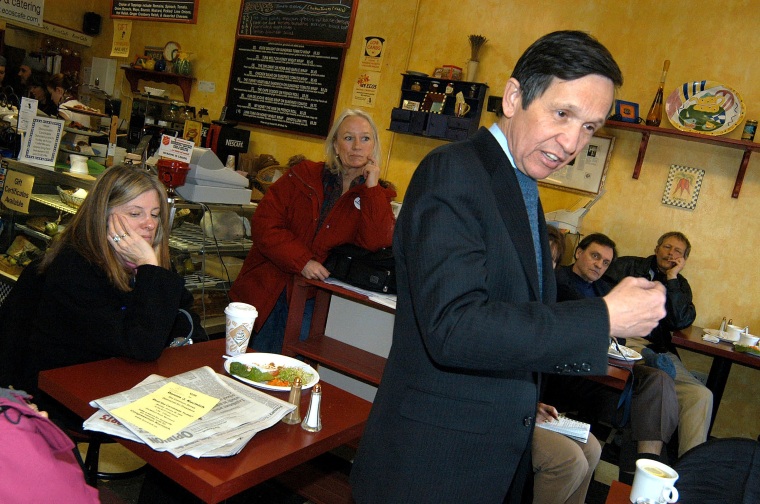Tuesday’s New Hampshire primary will set the stage not only for what could turn out to be a prolonged fight to exhaustion among Democratic presidential contenders, but also for the general election contest that Democrats will wage against President Bush.
Here's a helpful script to follow:
The margin of victory
This determines the “bounce.” If Massachusetts Sen. John Kerry can finish first by a margin of 10 percentage points or better, he will have won a substantial victory and will have demonstrated to Democratic donors and voters that he could well defeat Howard Dean in most of the seven contests that take place next Tuesday. Remember that Kerry has come back from being nearly written off in early December. A solid 10-point margin would settle any doubts that Kerry is the odds-on favorite to win the nomination.
Will turnout buoy Democrats?
The point of this contest is not only to win a primary but to find the candidate who can defeat Bush in November. In 2000, Bush carried New Hampshire by 7,211 votes, or about one percentage point. A strong Democratic turnout, with an admixture of discontented independents, would give Democrats hope of carrying marginal states such as New Hampshire, Nevada and Minnesota. (Al Gore lost Nevada and just barely won Minnesota in 2000.) A total turnout of 180,000 in Tuesday’s voting would be encouraging for Democrats.
The Kucinich factor
Rep. Dennis Kucinich of Ohio gets scant attention from the mainstream news media, but his unwavering anti-war message could draw two or three percent of the vote. If the Kerry-Dean battle is very close and Dean loses, he may well wish he’d gotten that two or three percent.
The 'Judy factor'
The Dean campaign brought his wife, Dr. Judith Steinberg, out on the campaign trail a few days before the Iowa caucuses and she has campaigned with him here in New Hampshire. The self-effacing Judy Dean is building a devoted cult following with the crowd at the Dean event in Nashua on Monday morning chanting, “Ju-dee, Ju-dee, Ju-dee,” prompting her husband to wryly call her “a rock star.”
Middle-aged women came up to her as she left the Nashua event and told her how much they admire her devotion to her work and to her family.
People often tend to vote for people whom they perceive as being like themselves. Judy Dean is someone with whom liberal middle-class women can identify. For some, a vote for Howard is a vote for Judy. The “Judy factor” might be worth a few extra percentage points, not only here in New Hampshire but in other states that lie ahead on the primary calendar.
A special precinct
Who wins the pro-defense, socially conservative, non-Ivy League Democrats who live in places such as Ward 10 on the west side of Manchester?
Dean and, to some degree, Kerry have a natural affinity for voters who went to Yale or Swarthmore, who have a household income of more than $150,000 a year, and who live in places like Peterborough or Hanover.
But what of those conservative Democrats such as those in Ward 10? Gore won the ward by narrow margin in 2000, but it voted for Republican John Sununu in the 2002 Senate election because voters trusted Republicans more on national security and because they were opposed to Democrat Jeanne Shaheen’s pro-choice views on abortion.
Will Wesley Clark or Sen. Joe Lieberman do well among such hawkish socially conservative Democrats? It’s a question that resonates beyond New Hampshire to other states in the South and Midwest, where Democrats need to regain their footing.
In the 2000 election, Bush won white working-class households with incomes of less than $75,000 a year by 13 percentage points, and non-college-educated whites by 17 points, according to research by political analyst Ruy Teixera. Ward 10 could be a test of which Democratic contender appeals to such voters.
The 'McCain factor'
Who, if anyone, is the John McCain of the 2004 Democratic field?
New Hampshire voters have a history of rewarding astringent, anti-establishment underdogs, such as Eugene McCarthy in 1968, Gary Hart in 1984, and McCain four years ago.
To some degree, Dean fits the astringent, anti-establishment mold, although McCain himself has been sharply critical of Dean's stance on Iraq. ""I don't believe that he has any understanding of the international role that the United States has to play in the world," McCain said last year.
